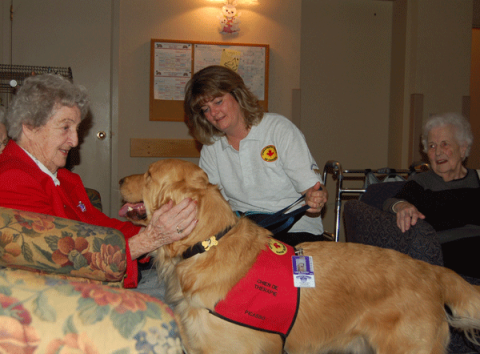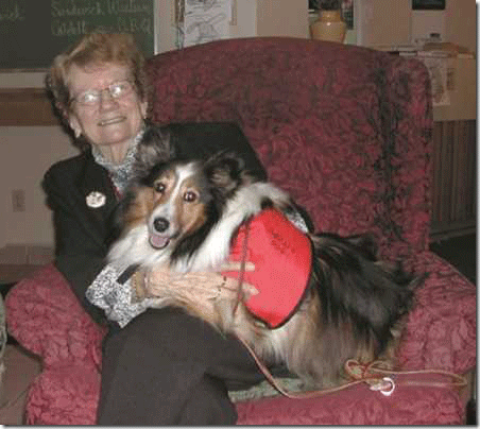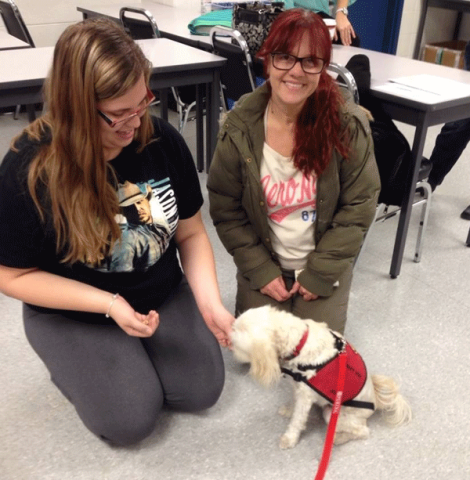
Prospective pets and their handlers are rigorously vetted by local TPOC team leaders before being unleashed, so to speak, on an often vulnerable population, who can expect soothing and uplifting contact with the 500-plus dogs and dozen-odd cats currently enrolled in the program.
Animals don’t require special training to participate; as TPOC states on its website, "In our experience pet therapy animals are usually born with the required temperament though some basic obedience skills are required."
That extends to all dog breeds including Bull Mastiff, Labrador Retriever, Shih Tzu, Wheaten Terrier, Shar Pei, Cavalier King Charles Spaniel and dozens more listed at the TPOC site.
Before visiting care facilities on their own, pets are put through the paces by their handlers in real-life settings while team leader evaluate their sociability. Their handlers, meanwhile, must pass police background checks and provide references.
In the end, though, such steps are enormously worthwhile for everybody. That explains why TPOC — founded by Judy Sauvé along with pooch Maggie in 2002 after more than a decade of doing similar work — today serves people from B.C.’s Sunshine Coast to P.E.I., offering roughly 80,000 hours of visiting time per year.
As Sauvé tells Samaritanmag from her eastern Ontario home, “It’s a win-win situation for all involved. Who doesn’t like to share their dog or cat that they love so dearly? It’s a wonderful gift you can give to somebody, especially a senior who maybe had to give up their pet to go into a residence. And the animals couldn’t ask for anything better – they are patted and cuddled and it’s just a wonderful life for them.”

She continues: “We accept any breed of dog or cat though it takes a special cat who likes to be held by strangers. But the cats we do have are phenomenal.
“What we’re looking for is an animal with a really good temperament, who is friendly and sociable with strangers but not to their point where their exuberance is dangerous. They need to be well-mannered. Our TPOC evaluators understand animal behavior and there is a four-part evaluation process.”
It begins with an initial phone interview followed by a police records checks, three references “which we absolutely check” and handlers must agree to limit their visits to one hour.
“We make sure people understand the guidelines. And we want to be sure the dog or cat behaves as well in a facility as they did in the evaluation, in a place where the noises and smells are different, where lots of people are present. We have to be sure the dogs are comfortable in the environments they’ll be working in.”
Precisely what behaviour potential therapy dogs and cats will be evaluated on is posted on the TPOC site as Sauvé believes in transparency. Categories include negotiating children and people on crutches and in wheelchairs (dogs) and reacting calmly to loud noises and being handled (cat).
“I wouldn’t want to write an exam I didn’t have a chance to prepare myself for,” Sauvé says. “If people feel their dog can’t handle one of the categories, they should take the time to train him on that point. It’s really disappointing when someone wants to get involved and then the dog doesn’t pass the test just because they lack a bit of training in a certain area. In that case, people can come back at a later time for another evaluation after they’ve worked on the issue. “
Any dogs showing aggression would not be invited back to take another test. “We cannot control who brings their dog into a facility,” Sauvé says. “So if Mrs. Jones’ niece decides she wants to bring her dog into the home, we need to be sure our dogs will be on their best behaviour.”

According to Sauvé, word of mouth is how most institutions find out about TPOC programs. “People working in the facilities talk about it because they see such a change in their clients on the days the animals come in,” she says.
“It’s hard to qualify the benefit of the service. We don’t do surveys or have doctors walking around behind us interviewing the seniors before and after the animal visits. But in comments, they all agree: pet visits lower blood pressure. People who come home from surgery heal quicker when there’s a pet in the home. Even visits that only last 10 minutes change the whole day for the senior.
“Sometimes when seniors first relocate to a facility they are withdrawn. But they so look forward to sitting and petting the dogs. And often they’ll talk to the dog as if we’re not there which is fine. Whatever they need, they’ll get. The bond between the human and the animal is very significant.”
Seniors in residence and those in hospital aren’t the only ones to benefit from TPOC’s ministrations. The Paws to Read program — where children read aloud to dogs to improve their reading skills and confidence — is offered at the primary school level.
The Paws Room program, meanwhile, is extended to universities and colleges “to provide emotional support and stress relief for students during exam week,” according to the site.
“We had students line up for three hours to get into a room to sit on the floor and pet a dog. I mean who knew?” Sauvé chuckles, adding that TPOC is always on the prowl for more volunteers and private donations.
“Students feeling stress and fretting about exams tell us they feel so much better after spending time with the dogs. And many have left their pets at home so they are missing that connection. We are definitely filling a niche.”
モッズコートのメンズコーデ術3選 , メンズファッションメディア